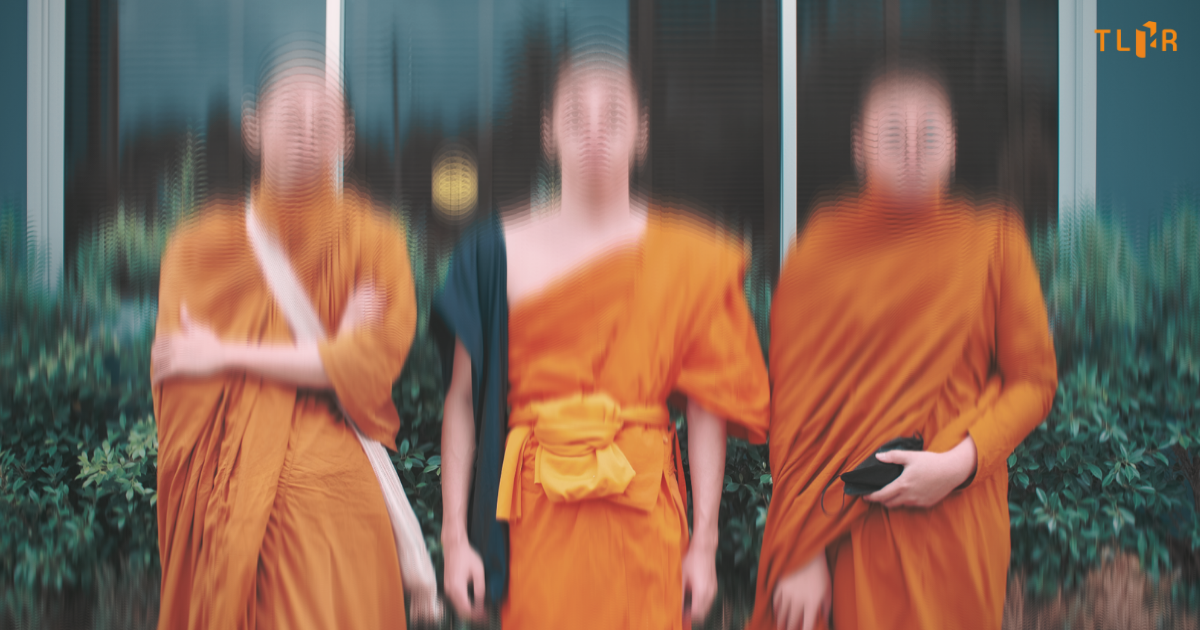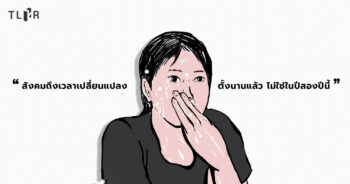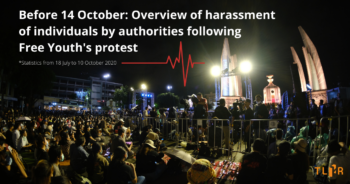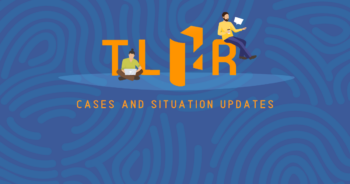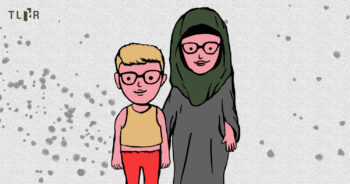This article recounts the path towards “enlightenment” of three monks and novices involved in political demonstrations for demanding democracy and equality alongside school and university students and ordinary citizens over the past year since the first protest held by the Free Youth Group on 18 July 2020. Moreover, this article will help our readers understand obstacles and challenges for monks who openly support social movements – the behavior which the Sangha Supreme Council of Thailand usually labels as “inappropriate involvement in political affairs.”
Our interview series “First Sermon before taking the path towards democracy: Background stories before the political awakening of Ratsadon monks/novices” are divided into three parts. Each of them presents the stories of individual monks and novices with unique backgrounds and paths leading them to join the fight for equality.
Read Part 1 >> Luang Pee Phupha: On being a Phu Paan kid, reading a protest poem on stage, and establishing the “Carrot Gang”
Read Part 2 >> The journey of thoughts of “Samanera Folk,” the novice who faces a lese majeste charge
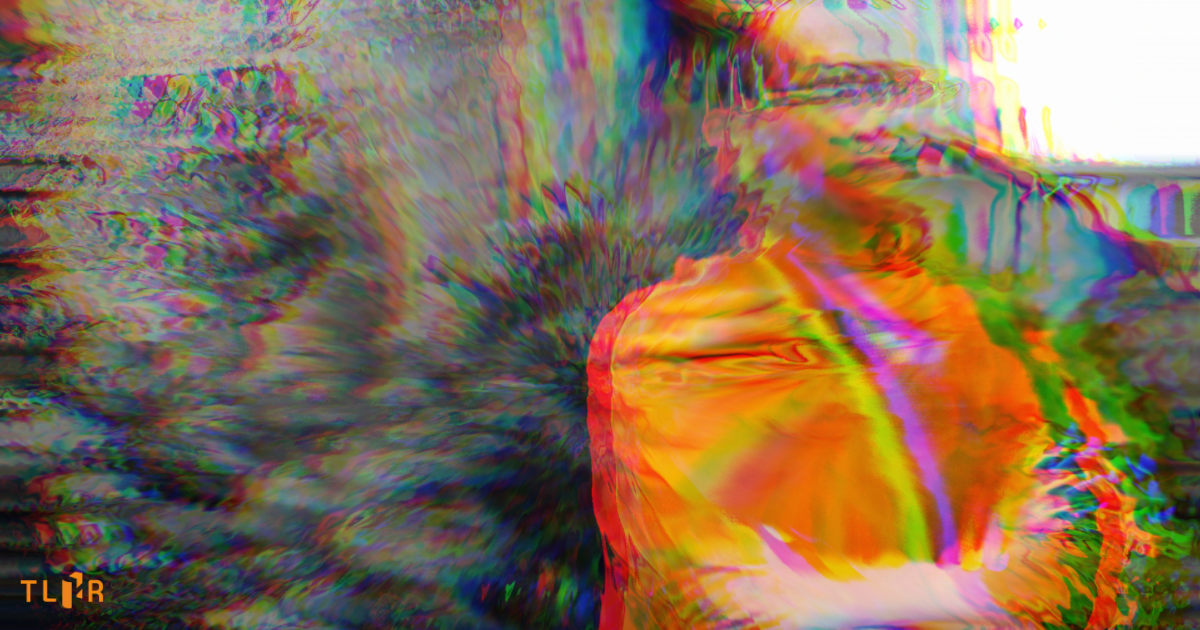
The monk who experienced the “explosion of new thoughts” thanks to a workshop on peaceful means of change
It took a long time before monks interested in politics dared to step up and get involved in social movements in Thai society. “Luang Pee Tham,” who has been ordained for 31 pansas (Rainy seasons), was one of those monks. Even once the social climate has become more open and supportive of political active monks, he faced constrained by several rules and other significant structural challenges that he could not easily resist.
“Before getting ordained, I was a student at Bangkok College of Technology, pursuing a High Vocational Certificate in Tourism. At the time, I intended to become a monk after graduation. Once I graduated at the age of 21 in 1990, I underwent ordination. Back then, I did not have clear political opinions. I had known about the massacre in October 1976 since I was seven years old because I saw it in the newspaper and heard adults talk about it. Growing up, I also read some stories about what happened in October that year and developed some sense of the importance of justice in our society. Still, up until I was 21 years old, I had never seen any large demonstrations. The first one I saw was the anti-government uprising in 1992. Back in my teenage years, I only understood politics to some extent.”
“In 1995, I had a chance to participate in a workshop on peaceful means of change. There was one session about LGBT rights. We took part in an activity called “Expression Line,” which allows all the participants to learn about the marginalization of different human identities, including LGBT identities that are often overlooked. Many were shocked to know that some participants identify as LGBT Back in 1995, most people do not have an awareness of this issue. Bringing up this issue, therefore, was like setting off a bomb. There was a brief period of dead air, which inspired me to question why people are unaccepting of gender diversity and why LGBT people must be subject to such social pressure.”
Luang Pee Tham recounted when he raised a big question about gender diversity for the first time. After the workshop activity on that day, he tried to explore and understand more about gender diversity to address this question.
“Six years later, in 2001, I published an article called “Gays and Lesbians: Whose Bad Karma?” on the magazine Sekiyatham which has both hard copies and online edition. The magazine features relatively progressive content. This article discusses how Buddhism perceives gender. It shows that LQBTs suffer not due to karmic consequences but rather patriarchy. Articles about Buddhism rarely tackle this issue, so it was widely shared online, including in gay online forums. Unfortunately, I heard that so many people were talking about it that some websites crashed due to the large traffic volume. Accordingly, I could not go back and check what they discussed. I am not sure if the content disappeared because the website crashed or because the webmaster deleted it.”
“At that time, the article changed the public opinion significantly. Still, many haters continue to insist that being LQBT is a sin under Buddhist teachings.”
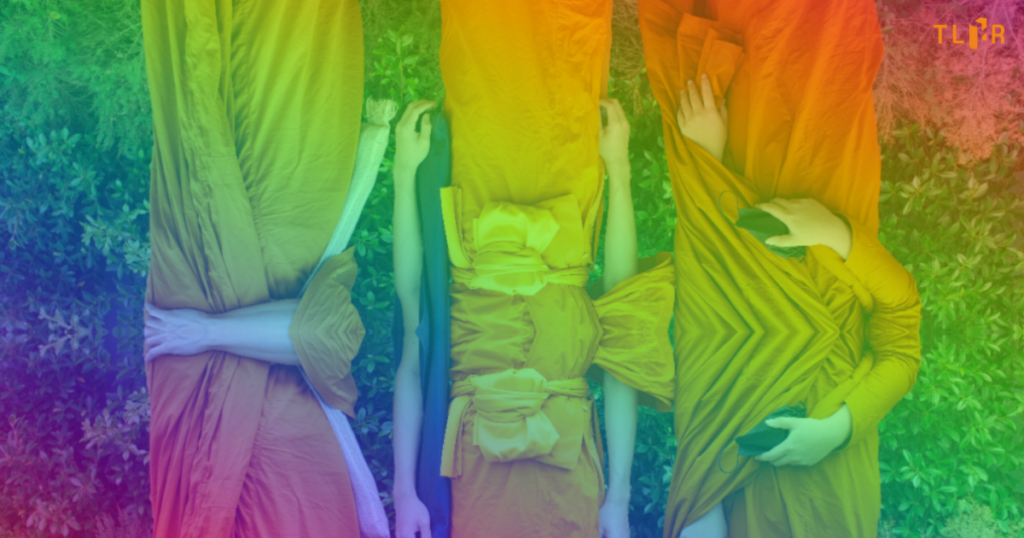
“Bad Karma” of monks and novices involved in political movements
“Previously, I had never shown up in person in any political activities because the society was not used to seeing monks holding up protest signs. However, recently, we are witnessing more participation of monks in political rallies, so I think that the society has become more accepting.”
“Since the end of 2020, we started to see images of monks joining political demonstrations. Social media users and communities reacted well and seemed more accepting. Pictures of monks holding up a sign have become a powerful driver of change. Previously, I went to the Parliament and held up the sign “People who went through abortion are not sinful. Stop condemning them.” I have dared to join the rallies because I feel safe.
Luang Pee Tham then spoke of his feelings before he decided to publicly express his political opinions, especially concerning the issue of gender diversity which he has been interested in for several years.
“On 17 May 2021, I held up the sign “LGBT did not commit bad karma. We are just oppressed by the patriarchy” in front of the Bangkok Art and Culture Center (BACC) on the International Day Against Homophobia, Transphobia, Biphobia (IDAHOT). I did not feel scared at all. After I finished holding up the sign, a plainclothes police officer ran after me. He told me that he was informed that a monk participated in a rally alongside ordinary people outside the clergy. Therefore, he requested to check my Buddhist monk identification card. I told him that I did not bring it with me and that I only had my national identification card,” Luang Pee Tham was referring to his experience when the authorities stopped him and asked to check his I.D. card due to his participation in a social movement.
“The officer told me that he still would like to see my national I.D. card, but I refused to give it to him. Then he showed me his card, affirming that he is an officer. Accordingly, I had to show him my card. At first, I tried to walk away, but there were many of them. I was there by myself. They tried to pressure and touch me. Even though we were in the middle of the COVID-19 outbreak, they still touched me. The officer did not only take the photo of my I.D. card but also ordered me to follow them to the police station. I also asked him why I still had to go there, given that he had already taken the picture.” Following this incident, Luang Pee Tham had to go to the police station with the plainclothes police officer to verify his national I.D. card.” Nothing happened to him on that day apart; he only had his I.D. card photographed and waited for the verification process at the police station.
Although Luang Pee Tham directly experienced physical harassment by the authorities, he still has not encountered any negative reactions from speaking out as a monk on issues, such as gender identities and abortion, which are considered controversial and inconsistent with the mainstream interpretation of Buddhist teachings.
“I did not notice how social media users commented on what happened to me. However, when I was taken to the police station, my friends shared that I had been arrested on their social media platforms. Many people were worried about me. I think that most people are not against what I do. Maybe some people are. However, in my opinion, the online communities generally do not exclude or look down on monks who join rallies and hold a protest sign.”
However, the most severe impact facing Luang Pee Tham stems from having his national I.D. card photographed.
“After the incident at the BACC, the police station sent a letter to my host temple with the photo of me holding a protest sign, as well as many other documents, as attachments. They were trying to complain about me to the abbot. The next morning, the abbot called for a meeting with me and ten other monk assistants to examine the content of the police station’s letter and documents. According to the letter, a monk participated in the activity by holding up a protest sign. While other protestors lit up candles, this monk also sat in the activity area to participate in the activity. It was like I was accused of wrongdoing. The abbot said he has been governing the temple for tens of years, but he has never dealt with this type of incident. I also thought to myself that I had been a monk for a long time, but I had never gone through this type of incident either. He also complained that my action jeopardized the reputation of the temple. I then thought to myself that my action might actually improve my temple’s reputation because I helped the public become more aware of inequalities in human society.” Luang Pee Tham told TLHR that the temple administration’s management approach could make the monks involved in politics feel guilty and embarrassed.
“I had to take time reflecting on my actions and assessing whether what I did was so severe. I was just an individual monk holding a protest sign. Holding the sign was no different from posing a dharma question for the audience to ponder and seek answers. I do not see why the police officers had to be bothered by my action.”
“Eventually, the abbot decided to put me on probation, which is like receiving a yellow card in sports. It is an official warning from the temple administration to prevent me from repeating my action. I had to sign the probation order to acknowledge the warning. Then the temple administration may have also forwarded the signed order to the police station to demonstrate that they have taken steps against what I did.”
This action led Luang Pee Tham to decide to stop his involvement in political rallies.
“I view that this process reflects the Sangha’s relationship with the State. The State grants rank and honors to some monks to vest them with authority to control other monks. The authorities do not perceive the monks’ political expression as the manifestation of the Four Noble Truths (Dukkha, Samudaya, Nirodha, and Magga) for marginalized persons. They merely see it as a violation of the Sangha Act, even though the legislation was enacted after the emergence of dharma doctrines.”
“I probably would not attend political activities anymore because I may face any unpredictable measure. One could say that I am subject to systematic harassment. Even though I could not go out to participate in the activities, there are many other ways to express our opinions about society, such as writing academic articles, which I have always been doing.
When asked whether monks could join hands and establish a pro-democracy temple that supports monks to express their political opinions, Luang Pee Tham stated,
“That is quite unlikely in this society because Thai monks are regulated under the Sangha Act B.E. 2505 (1962) on the one hand. Even though we are also governed under the dharma doctrines, on the other hand, the 1962 Sangha Act appears to hold more authoritative power over monks’ actions.”
“Civil servants, monks, students – we are all oppressed under the same system. We are living in the ‘state within a state.’ It would not be easy to reform the system internally. If a monk is forced to leave the monkhood due to his political participation, he may not get ordained again. No one would be brave enough to ordain these monks because all the preceptors in Thailand are under the State’s control. In sum, our saffron robes do not belong to the Buddha, but rather to the State.”
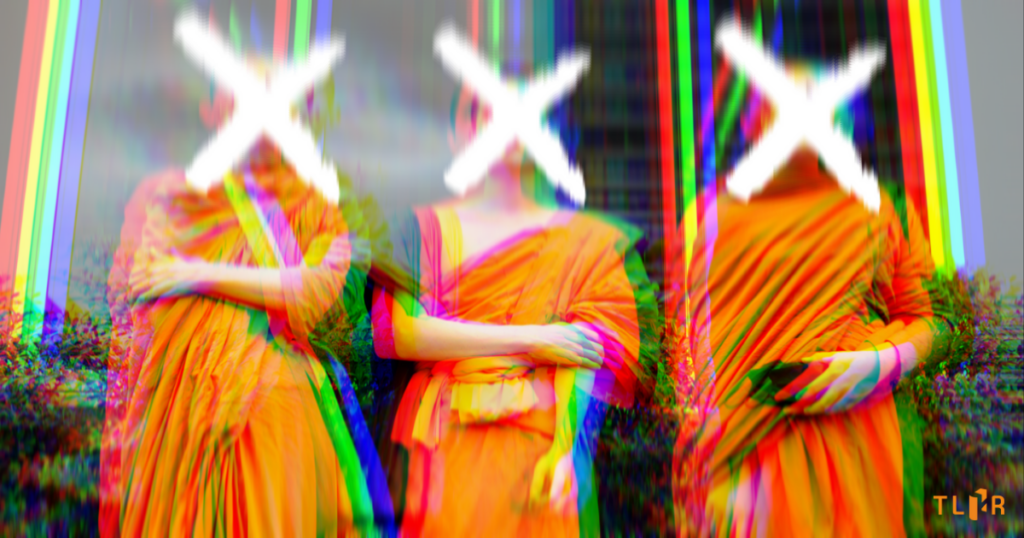
Dreams of the future of Sangha institutions and clergy
“I would like the Sangha Act to be repealed and the voting rights to be returned to monks. Any religious affairs shall also be separated from the State. Budgets allocated for religious affairs should be repurposed for developing the country in other areas or providing the general welfare of the people. We spend billions of baht on religion, even though we should be using this budget for the people’s welfare. I share the same belief as many activists that religion should be a matter of individual faith, personal practices, and private affairs. It should not be a national priority. As religion is a private matter, we should not even include it on our national I.D. cards. In Europe or the USA, a person’s religious identity is not listed on their I.D. card either.
Above is the opinion of a 53-year-old monk who supposedly belongs to the privileged class in Thailand due to the cultural capital that comes as a package with the monkhood. This story testifies to the fact that spending more than ten pansas in monkhood and being a middle-aged man does not make Luang Pee Tham have flawed or less advanced understandings about rights and liberties at all. He affirmed with TLHR that he believes human life is more important than religion.
“Between human and religion, I think the human is more important because we are living beings. The State should not promulgate laws to protect religion, which is a non-living thing. At present, several laws have been issued to protect the religion, such as the ban on dressing as a monk. Such legislation only serves to protect the religious robe instead of human life. There is also a law prohibiting blasphemy that prioritizes religion over human life. If religion is prioritized, does that mean human life does not matter for the State? Religion is human made. We need to re-assess our priorities to understand better whether religion or human is more important.”
“Religion is passed down from one generation to the other. It is like the ‘telephone game’ in which ten players form a line, and the first person comes up with a message and whispers it to the next player, and so on. By the time the message is communicated to the tenth person, it usually is distorted. The religious texts are based on the language that originated more than thousands of years ago and got passed on from one continent to other territories with distinguished languages and cultures over several millenniums. How could it not be distorted? Accordingly, it may not be worthwhile for the State to enact a law to protect the religion and go the extra mile to prove the righteousness of such an action, including by punishing those violating the law through execution, fines, and imprisonment. It normally takes a person’s entire life to test and come to terms with their faith. Is it fair to allow a minutes-long verdict to cost the accused of their property and liberty?”
“Still, even though we could bring the dharma doctrines back for governing the Sangha, it is crucial for us to reform them first. We must assess which doctrine is still relevant and which one is outdated. These doctrines may be suitable for governing a group of monks living thousands of years ago, but they may not work for those in the present.” On this note, Luang Pee Tham ended his interview.
